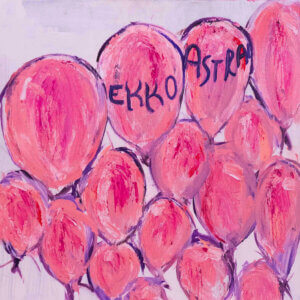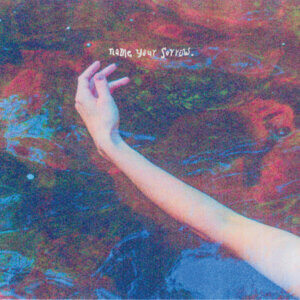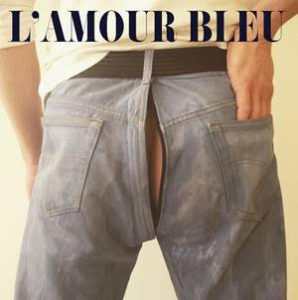Our interview with L’Amour Bleu

Ryan Schaefer: Has anyone seen this show called Naked and Afraid on the Discovery Chanel?
Shane Ruth: Is that how you feel, Ryan?
RS: That’s how I feel right now. There are these two naked people stomping around in a swamp and they have spears, and they are killing animals and eating them. It’s like Survivor, but they’re naked.
SR: The best part about that T.V. show is the title, because it’s like, maybe you could feel like that at any time of your life.
RS: True.
This is how my interview with L’Amour Bleu begins, with Ryan and Shane speculating on what it’s like to be naked and afraid in the woods. Although self-proclaimed “meat wave” band L’Amour Bleu is based in Queens, NY, I reach Ryan, Shane and Matt Tong spread across cities over a conference call. I learn that their collaboration isn’t dependent on being in close proximity to one another, but they share a certain synchronicity. The bandmates answer questions as if sharing a sofa.
L’Amour Bleu is Ryan Schaefer, Shane Ruth, Matt Tong and Asher Ireland. Their album, Please comes out February 14 on Static Recital.
Northern Transmissions: Your press release describes Please as “avant-garde riff rock.” The recordings definitely have a live performance aspect to them. What about that quality of production speaks to you as band? How did it come together?
RS: We have a funny way of working that probably informs the way the sound ends up. We all send each other a lot of things. We don’t go into a studio and say, “Lets record a song today,” and do it that way, how a lot of bands do … The way we often do things is send [music] back and forth to each other, adding things, and sending it back many times until it develops into an interesting concoction … Like, if I make a part and Matt hates the way it sounds, he just replaces it.
Matt Tong: —Without telling anyone that I was the one who replaced it.
RS: Exactly. We’re fluid in that way, where we have the freedom to change peoples’ stuff and the openness to say, “I really hate the way you played that part,” or “that was really sloppy,” or “your voice sounds like shit.”
MT: We’ve known each other for a long time, before we even went down this road of making music together. It all compliments our music backgrounds as well. We make a safe space to work through ideas. No one ever really feels offended or holds onto a certain idea about something. There is a mutual understanding. There was a lot of stuff on the record that sounded kind of sketchy, demo recordings that made it on.
NT: L’Amour Bleu refers to the book that looks at representations of men, with a particularly voyeuristic stance. In your music is a lot of talk about the male gaze, which also has a predatory impulse. Is gaze something you question as a band?
RS: I think we’re aware of that, and we play with that. We’re close friends with a woman who collaborated with us recently on the “Human Mattress” video. She’s an artist and a teacher, and her name is Cara Benedetto. She’s a very academic feminist [and] has strong points of view on things. Sometimes we will bounce something off her to get her feedback, so that it’s not just us as men making decisions about things. … Sometimes we play with sexuality pretty intensely, and you have to make sure you’re questioning what you’re doing.
SR: But in the question you also used the word ‘predator.’ I think we would be much more likely to point out the victim of certain situations, and not just gender-based either— the sadness of loss, or heartbreak that you find yourself in. We’re more likely to talk about that than feeling like, or even commenting on, anything that is predatory.
NT: As you point out, sometimes you play with intense themes around sex. Your band aesthetic also has a lot of animal prints, glitter and drag, which seems to throwback to the Glam era. What attracts you to that?
MT: I don’t know. I had very long hair as a teenager and I got a lot of comments about it from strangers, and then I went through a period of having short hair. I recently grew my hair back again and I still get the same kind of comments. I think that’s really strange in 2017, also within the context of living in New York City. I was thinking about David Bowie in the ‘70s. He was really so out there. As a British person operating within the UK, which was a pretty bleak place at the time and not really open to that kind of presentation … Maybe our presentation isn’t that exceptional compared to what’s come before, but it seems that it’s weird that it’s still notable, that there are certain expectations that haven’t changed.
RS: I would say it’s also accidental that it’s an aesthetic we’re connected to because that’s just who we are naturally … When we’re home on a Tuesday night we’re often dancing in front of a mirror listening to Madonna, wearing a wig, and then send each other the videos. That’s just how we have fun. We are who we are, and it’s not a certain aesthetic we’re attracted to. It’s funny you say glam. I don’t think of it as glam, but in a way I guess it could be.
NT: Please is the title of your album. I wonder, is ‘please’ you asking for something or begging for something?
RS: It’s both, it’s everything.
MT: When we started out the band was called Please … I think for me, it’s kind of an obscene word somehow. It makes me feel uncomfortable. I use the word out of politeness, but it always makes me feel a little funny.
ST: … It can also be an urge or an invitation.
Interview by Brit Bachmann
https://youtube.com/watch?v=pUSB9OBVCro
Latest Reviews
Tracks
Advertisement
Looking for something new to listen to?
Sign up to our all-new newsletter for top-notch reviews, news, videos and playlists.





